| Listing 1 - 10 of 31 | << page >> |
Sort by
|
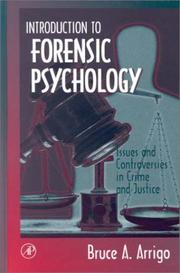
ISBN: 0120643502 Year: 2000 Publisher: London Academic Press
Abstract | Keywords | Export | Availability | Bookmark
 Loading...
Loading...Choose an application
- Reference Manager
- EndNote
- RefWorks (Direct export to RefWorks)
Psychology, Forensic --- Juridical psychology --- Juristic psychology --- Legal psychology --- Forensic sciences --- Psychology, Applied --- Forensic psychology. --- Forensic psychology
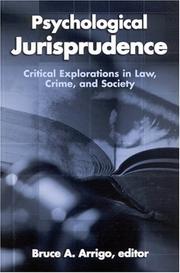
ISBN: 0791484734 1423739701 9781423739708 0791461521 9780791461525 0791461513 9780791461518 9780791484739 Year: 2004 Publisher: Albany State University of New York Press
Abstract | Keywords | Export | Availability | Bookmark
 Loading...
Loading...Choose an application
- Reference Manager
- EndNote
- RefWorks (Direct export to RefWorks)
Psychological jurisprudence—or the use of psychology in the legal realm—relies on theories and methods of criminal justice and mental health to make decisions about intervention, policy, and programming. While the intentions behind the law-psychology field are humane, the results often are not. This book provides a "radical" agenda for psychological jurisprudence, one that relies on the insights of literary criticism, psychoanalysis, feminist theory, political economy analysis, postmodernism, and related strains of critical thought. Contributors reveal the roots of psycholegal logic and demonstrate how citizen justice and structural reform are displaced by so-called science and facts. A number of complex issues in the law-psychology field are addressed, including forensic mental health decision-making, parricide, competency to stand trial, adolescent identity development, penal punitiveness, and offender rehabilitation. In exploring how the current resolution to these and related controversies fail to promote the dignity or empowerment of persons with mental illness, this book suggests how the law-psychology field can meaningfully contribute to advancing the goals of justice and humanism in psycholegal theory, research, and policy.
Crime --- Insanity (Law) --- Forensic psychology. --- City crime --- Crime and criminals --- Crimes --- Delinquency --- Felonies --- Misdemeanors --- Urban crime --- Social problems --- Criminal justice, Administration of --- Criminal law --- Criminals --- Criminology --- Transgression (Ethics) --- Criminal insanity --- Insanity --- Insanity (Jurisprudence) --- Lunacy (Law) --- Mental illness --- Mentally ill --- Capacity and disability --- Insanity defense --- Juridical psychology --- Juristic psychology --- Legal psychology --- Psychology, Forensic --- Forensic sciences --- Psychology, Applied --- Psychological aspects. --- Social aspects --- Law and legislation --- Legal status, laws, etc. --- Forensic psychology --- Psychological aspects
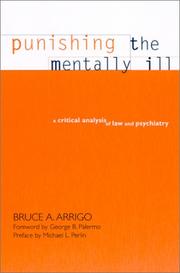
ISBN: 0791488438 9780791488430 9780791454046 0791454045 0791454037 0791454045 9780791454039 Year: 2002 Publisher: Albany State University of New York Press
Abstract | Keywords | Export | Availability | Bookmark
 Loading...
Loading...Choose an application
- Reference Manager
- EndNote
- RefWorks (Direct export to RefWorks)
A powerful, sophisticated, and original critique on how the disciplines of law and psychiatry behave and on how the mental health and justice systems operate, Punishing the Mentally Ill reveals where, how, and why the identity and humanity of persons with psychiatric disorders are consciously and unconsciously denied. Author Bruce A. Arrigo contends that despite periodic and well-intentioned efforts at reform, the current law-psychiatry system functions to punish the mentally ill for being different. The book synthesizes a wide range of mainstream and critical literature in sociology, law, philosophy, history, psychology, and psychoanalysis to establish a new theory of punishment at the law-psychiatry divide. To situate the analysis, enduring psycholegal issues are explored including the meaning of mental illness, definitions and predictions of dangerousness, the ethics of advocacy, the right to community-based treatment, the logic of forensic courtroom verdicts, transcarceration, and the execution of mentally disordered offenders among others. Punishing the Mentally Ill shows that current mental disability law research, programming, and policy are seriously flawed and that wholesale reform is necessary if the goals of citizen justice, social well-being, and humanism are to be realized.
Insanity (Law) --- Mentally ill --- Punishment --- Commitment and detention
Book
ISBN: 1784025755 145227410X 1483346587 9781452274102 9781483346588 9781452274119 1452274118 9781784025755 9781483389790 1483389790 Year: 2014 Publisher: Los Angeles : SAGE reference,
Abstract | Keywords | Export | Availability | Bookmark
 Loading...
Loading...Choose an application
- Reference Manager
- EndNote
- RefWorks (Direct export to RefWorks)
This encyclopedia includes entries by experts in the field which explore the scope of ethical decision-making and behaviours within the spheres of criminal justice systems, including policing, corrections, courts, forensic science, and policy analysis and research.
Criminal justice, Administration of --- Administration of criminal justice --- Justice, Administration of --- Crime --- Criminal law --- Criminals --- Moral and ethical aspects --- Law and legislation --- Singh, Charan. --- Charan Singh --- Siṃha, Caraṇa --- Caraṇa Siṃha --- Justice pénale --- Justice (philosophie) --- Administration --- Singh, Charan, --- Charan Singh, --- Siṃha, Caraṇa, --- Caraṇa Siṃha, --- Justice pénale
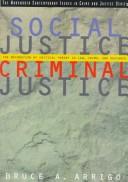
ISBN: 0534545580 Year: 1998 Publisher: Belmont (Calif.) : Wadsworth,
Abstract | Keywords | Export | Availability | Bookmark
 Loading...
Loading...Choose an application
- Reference Manager
- EndNote
- RefWorks (Direct export to RefWorks)
Criminal justice, Administration of. --- Criminology. --- Social justice.
Book
ISBN: 1483359964 148335993X 1483359921 1483359956 9781483359953 9781483359960 9781483359939 9781483359922 Year: 2018 Publisher: Thousand Oaks : SAGE Publications,
Abstract | Keywords | Export | Availability | Bookmark
 Loading...
Loading...Choose an application
- Reference Manager
- EndNote
- RefWorks (Direct export to RefWorks)
Although surveillance hit the headlines with revelations by Edward Snowden that the NSA had been tracking phone calls worldwide, surveillance of citizens by their governments actually has been conducted for centuries. Only now, with the advent of modern technologies, it has exponentially evolved so that today you can barely step out your door without being watched or recorded in some way. In addition to the political and security surveillance unveiled by the Snowden revelations, think about corporate surveillance: each swipe of your ID card to enter your office is recorded, not to mention your internet activity.
Electronic surveillance --- Privacy, Right of --- National security --- Social aspects.
Book
ISBN: 9780754629276 0754629279 9781315089584 9781351553520 Year: 2010 Publisher: Farnham: Ashgate,
Abstract | Keywords | Export | Availability | Bookmark
 Loading...
Loading...Choose an application
- Reference Manager
- EndNote
- RefWorks (Direct export to RefWorks)
Criminology --- Criminal behavior --- Criminal psychology --- Criminal behavior. --- Criminal psychology. --- Criminology.
Book
ISBN: 9786612496905 074256567X 1282496905 1282713744 9786612713743 1442202599 9780742565678 9781442202597 9781282496903 9781282713741 9780742563629 0742563626 9780742563636 0742563634 Year: 2009 Publisher: Lanham (Md) Rowman & Littlefield
Abstract | Keywords | Export | Availability | Bookmark
 Loading...
Loading...Choose an application
- Reference Manager
- EndNote
- RefWorks (Direct export to RefWorks)
Revolution in Penology is a thoroughly original and thought-provoking critique of penal harm, the recursive pains of imprisonment cycle, and the normalization of violence.
Criminology. --- Punishment. --- Criminal justice, Administration of. --- Administration of criminal justice --- Criminal justice, Administration of --- Justice, Administration of --- Crime --- Criminal law --- Criminals --- Penalties (Criminal law) --- Penology --- Corrections --- Impunity --- Retribution --- Social sciences --- Law and legislation --- Study and teaching
Book
ISBN: 012382169X 9780123821690 Year: 2012 Publisher: [Place of publication not identified] Academic Press
Abstract | Keywords | Export | Availability | Bookmark
 Loading...
Loading...Choose an application
- Reference Manager
- EndNote
- RefWorks (Direct export to RefWorks)
Forensic psychology --- Psychiatry --- Social Control, Formal --- Criminology --- Forensic Medicine --- Social Problems --- Health Care Economics and Organizations --- Medicine --- Social Sciences --- Sociology --- Behavioral Sciences --- Forensic Sciences --- Health Occupations --- Health Care --- Anthropology, Education, Sociology and Social Phenomena --- Behavioral Disciplines and Activities --- Psychiatry and Psychology --- Disciplines and Occupations --- Law Enforcement --- Forensic Psychiatry --- Crime --- Jurisprudence --- Prisons --- Public Health --- Health & Biological Sciences --- Legal & Forensic Medicine
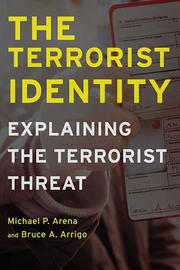
ISBN: 0814707157 0814707165 9780814707159 9780814707166 1429486031 0814707815 Year: 2006 Publisher: New York : New York University Press,
Abstract | Keywords | Export | Availability | Bookmark
 Loading...
Loading...Choose an application
- Reference Manager
- EndNote
- RefWorks (Direct export to RefWorks)
"Arena and Arrigo give us a brilliant glimpse into the 'terrorist' psyche as they detail the creation and maintenance of identity in various terrorist organizations. Their conceptual framework has important implications for law enforcement, public policy makers, and academic researchers engaged in the study of terrorism." -Lynne Snowden, co-author of 'Collective Violence'"The overall quality of this book is astonishing, the ease of reading and the depth of theoretical knowledge, equally impressive. It is a valuable contribution to the terrorism literature and of such quality that it will be quoted, used, debated, and confronted by researchers for years to come. This book represents a vanguard of sociological thought on this subject and is a much needed voice in the debates on terrorism." -James David Ballard, author of Terrorism, Media, And Public Policy: The Oklahoma City BombingWho would strap a bomb to his chest, walk into a crowded subway station and blow himself up? Only by examining how a terrorist understands his own identity and actions can this question be answered. The authors of The Terrorist Identity explore how the notion of self-concept combined with membership in terrorist and extremist groups, can shape and sustain the identity of a terrorist as well as their subsequent justification for violence and the legitimacy of their actions.The book provides an understanding of identity that draws on concepts from psychology, criminology, and sociology. Notably, the book examines several case studies of various terrorist groups, including: the Provisional Irish Republican Army, Hamas, the Shining Path, the Liberation Tigers of Tamil Eelam, and racist Skinheads. By making the construct of identity central to this analysis The Terrorist Identity explains how violent and extremist collective behavior emerges culturally, how it informs the identity of group members socially, and how participants assume their place in these groups completely even at the expense
Group identity. --- Terrorism. --- Terrorists -- Psychology. --- Terrorism --- Terrorists --- Group identity --- Criminology, Penology & Juvenile Delinquency --- Social Welfare & Social Work --- Social Sciences --- Psychology --- Psychology. --- Terrorisme --- Terroristes --- Identité collective --- Psychologie --- Acts of terrorism --- Attacks, Terrorist --- Global terrorism --- International terrorism --- Political terrorism --- Terror attacks --- Terrorist acts --- Terrorist attacks --- World terrorism --- Direct action --- Insurgency --- Political crimes and offenses --- Subversive activities --- Political violence --- Terror --- Collective identity --- Community identity --- Cultural identity --- Social identity --- Identity (Psychology) --- Social psychology --- Collective memory
| Listing 1 - 10 of 31 | << page >> |
Sort by
|

 Search
Search Feedback
Feedback About UniCat
About UniCat  Help
Help News
News